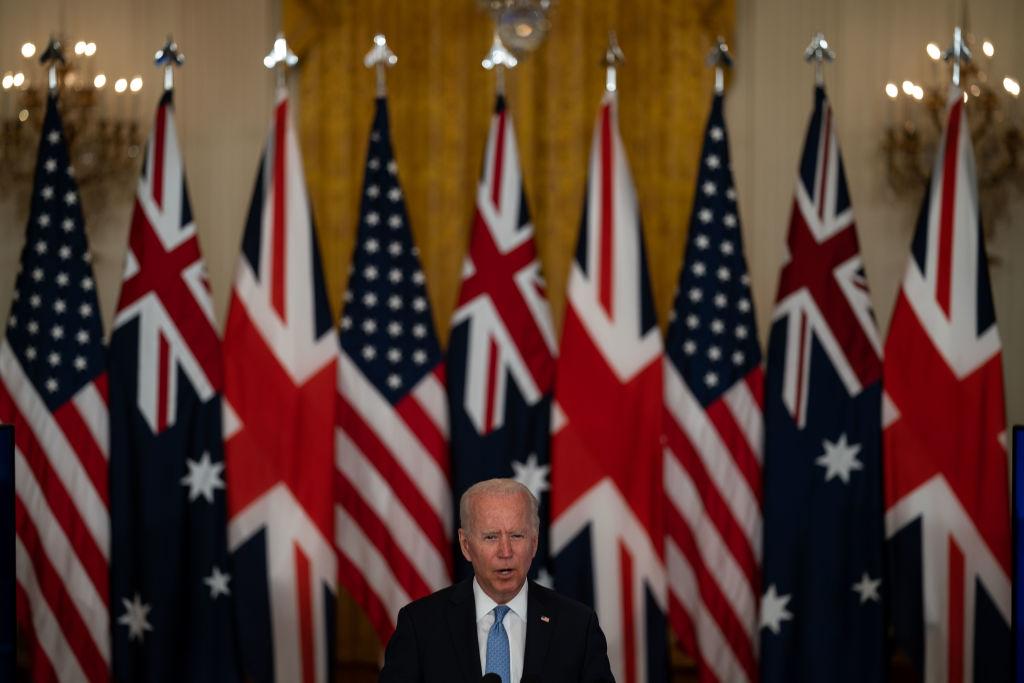Hypersonic missile announcement revives US media interest in AUKUS
Posted By Mark Watson on April 7, 2022 @ 13:10

The AUKUS agreement was launched with great ceremony by the leaders of Australia, the United Kingdom and the United States last September. At the time, there was considerable interest in the US in both the fact of the agreement and in its detail—particularly the headline-grabbing announcement of a nuclear-propelled submarine program for Australia. Since then, the prevailing sentiment in Washington has been—so, now what?
The leaders’ statement [1] on progress under the AUKUS pact issued by the White House yesterday at least partially answers that question.
Again, there was a headline announcement—a new focus on ‘trilateral cooperation on hypersonics and counter-hypersonics, and electronic warfare capabilities’—accompanied by a series of smaller, less specific announcements relating to progress on a range of joint technological development projects.
The White House announcement was welcomed by the newly formed congressional AUKUS working group (aka the ‘AUKUS caucus’), a bipartisan grouping that aims to be the principal panel in the US Congress for collaboration on the AUKUS alliance. In a joint statement [2], the co-chairs of the caucus said that President Joe Biden’s statement was ‘an encouraging update of the work done to date to translate [the AUKUS agreement] from a concept into real, tangible change’.
While it’s clear that much of what AUKUS aims to achieve is in response to China’s aggressive manoeuvring in the Indo-Pacific, most of the news stories in the US reporting the new focus on hypersonic technologies and weapons have linked the announcement to the war in Ukraine and Russia’s use of hypersonic missiles to target Ukrainian cities. The two main questions being asked about these seemingly unstoppable weapons: What are they and who has them?
The chairman of the Joint Chiefs of Staff, General Mark Milley, confirmed last October that China had tested hypersonic weapons, and now it seems clear that Russia has field-tested the new technology. The Pentagon is playing catch-up, and its 2023 budget request includes US$4.7 billion for research on and development of hypersonic weapons. On current planning, the US will have a hypersonic missile battery deployed by 2023, a sea-based missile system by 2025 and an airborne cruise missile by 2027.
Biden’s statement on progress under the AUKUS arrangement followed consultations with prime ministers Scott Morrison and Boris Johnson, and stitched together a number of themes currently running through strategic policy discussions in the US: the transition from ‘strategic competition’ with China and Russia to ‘strategic deterrence’; advanced technology innovation as a path to restoring the US military’s competitive advantage over America’s adversaries; entrenching supply-chain security within national strategic planning frameworks (not least through greater reliance on traditional partners and allies like Australia); and the need to confront simultaneous threats coming from China and Russia.
Appearing before the House Armed Services Committee on Tuesday, the Joint Chiefs chairman made clear [3] that ‘the potential for significant international conflict between great powers is increasing, not decreasing’. He went on to say that the strategic challenge posed by China—which he described as the ‘pacing challenge to America’—required the US military to maintain ‘competitive overmatch’ in the cyber, space, land, sea and air domains.
Recognising the need to strike an appropriate balance between the threats posed by Russia and China has delayed finalisation of the draft US national defence strategy. Russia’s invasion of Ukraine, combined with its nuclear sabre-rattling, have made it difficult to stick to previous judgements about the greater risk posed by the enduring threat of conflict with China.
While Biden’s statement also referenced ‘Russia’s unprovoked, unjustified, and unlawful invasion of Ukraine’, it did so as a counterpoint to the AUKUS countries’ ‘unwavering commitment to an international system that respects human rights, the rule of law, and the peaceful resolution of disputes free from coercion’.
Defence Minister Peter Dutton effectively joined the dots when he said that Russia’s invasion of Ukraine has been a ‘wake-up call’ that other, similar threats could be in the offing. Discussing the new AUKUS emphasis on hypersonics, Dutton said that China’s increased military presence in the South China Sea meant that the new missile systems would be necessary help Australia deter any act of aggression from China.
Article printed from The Strategist: https://aspistrategist.ru
URL to article: /hypersonic-missile-announcement-revives-us-media-interest-in-aukus/
URLs in this post:
[1] leaders’ statement: https://www.whitehouse.gov/briefing-room/statements-releases/2022/04/05/aukus-leaders-level-statement/#:~:text=In%20light%20of%20Russia
[2] joint statement: https://courtney.house.gov/media-center/press-releases/aukus-working-group-issues-statement-new-details-trilateral-defense
[3] made clear: https://www.defense.gov/News/News-Stories/Article/Article/2989958/potential-for-great-power-conflict-increasing-milley-says/#:~:text=America
Click here to print.